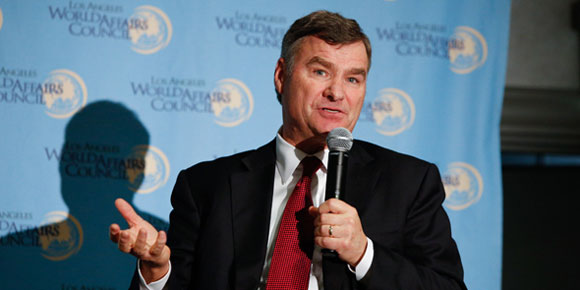
Mike White, the President, CEO and Chairman of DIRECTV, said the days of bundling tv channels for consumers are on the way out, the media companies’ costs for their content have become way too high, and even though tablets and smartphones are the hot new thing, televisions will still be in the house of the future. In a wide-ranging talk about the future of the media, which he says is being revolutionized by the internet and the new viewing habits of millenials, White also reached back into his previous job at Pepsico to reveal the secret of what differentiates the taste of Pepsi and Coke.
“We seem to be the only country in the world who will pay $100 a month for TV,” said White, when he thinks most consumers can only really afford about $60-$70 a month. When Time Warner guaranteed the Dodgers a huge increase in revenues for broadcast rights, and then came to DIRECTV expecting them to pass on those additional costs to their subscribers, White said no. “Sometimes you have to take a tough stance. These prices are unsustainable… by now you would think people would see it is a broken system.” He said that when it came to setting prices between content providers and distributors (like DIRECTV) “virtually every negotiation is a public relations war.” The change will come from the millennials, he thinks, who are used to getting much of their entertainment online. “They won’t put up with 200 plus channels they don’t want.”
It is because of the growth of online entertainment – as seen most powerfully with Netflix’s streaming video – that DIRECTV is entering into a merger with AT&T, who can give the El Segundo-based company access to broadband. “Every industry today is being disrupted by the internet,” said White – and it is going mobile at warp speed. “When I came to DIRECTV in 2009, there were no tablets or iPhones – by 2020, video will be two thirds of all data flowing through wireless services – the future of mobile usage is all video.” But that notwithstanding, White still thinks that when the millennials – finally – move out of their parents’ homes and set up on their own, their living rooms will still have a television – “because of the quality of their screens – wait until you see the new 4K ultra high definition screens that are coming out next year.”
DIRECTV has 39 million subscribers in the Americas, but has substantial barriers in expanding into other media markets around the globe – in Europe most countries have their own satellite broadcasters in place, and in countries like Russia and China the governments don’t take kindly to an American company trying to install satellites on the roofs of millions of homes in their country. "Doing business overseas is always a challenge – the most important thing is the local talent you are able to recruit on the ground – it takes locally savvy folks."
Before coming to DIRECTV White was head of Pepsico International, and when asked whether he could personally tell the difference between the taste of Pepsi and Coke in the infamous blind “Challenge”, he gave away the insider’s tip. “The way you make sure you don’t embarrass the company is you have to smell it first before drinking – Coke has a hint of vanilla, and that is a very distinctive smell.”
Apart from being able to finally discriminate between their colas, White was also upbeat about the future of individuals’ abilities to discriminate more in what they choose to pay for in their entertainment, as the pressure increases from millennials to allow people to choose what they want to watch a la carte. “The real winner in my mind is the consumer.”
